With so much probiotic talk, today I wanted to share all about prebiotics and give you what I believe to be are the best prebiotics supplements.
Before I even dig into all things prebiotics, I must state something so the SIBO and severe-IBS police aren’t on my case. If you have extreme dysbiosis, SIBO (small intestine bacterial overgrowth), IBS or you’re on a low-FODMAP diet, focusing on prebiotics right now might not be your best option.
You must first make sure your gut flora is mostly balanced before introducing a lot of prebiotics.
It’s normal for the first few days to have some gas, bloating, and digestive discomfort from prebiotics. But if these symptoms are experienced long-term, get back on the gut-healing train and focus on a healthy gut microbiome with appropriate bacterial balance.
Also make note, on the flip side, that this could be a good experiment for you to try. If you suspect you have any of the above conditions, adding prebiotics consistently into your daily routine for a week might be an indicator of your current bacteria balance.
Long term, prebiotics are absolutely important.
In fact, I think we have almost overplayed PRObiotics and severely underplayed PREbiotics.
With that, let’s dig right in.
Best Prebiotics Supplements + All About Prebiotics
Click HERE to save this post for later.
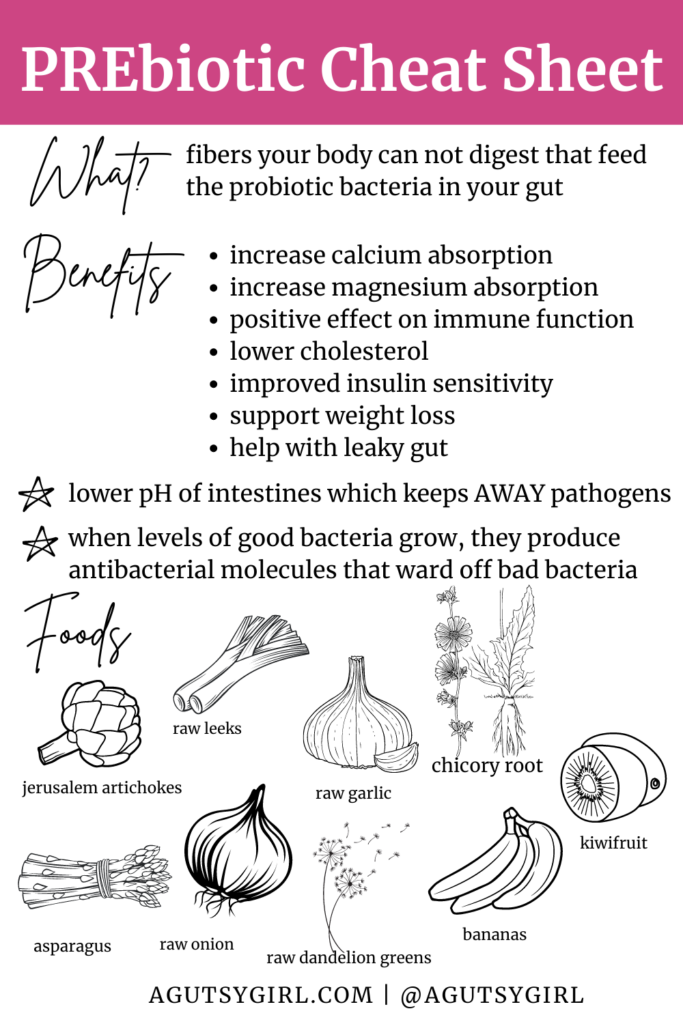
To start with, here are 3 things to know about prebiotics and your overall health:
- They are not absorbed in your upper GI tract.
- Prebiotics must resist the acidity of the stomach.
- And they have the ability to be fermented by intestinal bacteria.
Prebiotics 101
Prebiotics feed the probiotic bacteria in your gut.
They are the fibers your body can’t digest, but that the gut loves.
Probiotics cannot survive without their food – prebiotics. The analogy that they used during the Gut Health Course was this: think of your gut like a garden. Probiotics are the plants, and prebiotics act as fertilizer. Plants need fertilizer to grow.
Besides the overarching reason we need prebiotics, here are 7 other benefits.
7 Prebiotic Benefits
There are many benefits of prebiotics in addition to the obvious of a healthy gut microbiome.
Here are 7:
- Increased calcium absorption, leading to improvement in bone density.
- Increased magnesium absorption.
- Positive effects on the immune system and immune function.
- Lower cholesterol.
- Improved insulin sensitivity.
- Support with weight loss.
- Help with leaky gut.
And here are 2 ways prebiotics benefit good bacteria exclusively:
- They can lower the pH of the intestines by feeding the bacteria that produces lactic acid. The low pH wards off pathogens, which tends to grow in higher pH environments.
- When the levels of good bacteria grow, they produce antibacterial molecules that ward off bad bacteria.
Pretty cool, right?
So, how can you get prebiotics in your diet?
First, it’s not that easy because the fruits and vegetables that are high in prebiotics can be very hard to digest. In fact, many in the Gutsy community might not even believe in the positive healthy effects simply because foods high in prebiotics seemingly cause a lot of digestive distress.
But let’s look closer at all of this.
Prebiotic Foods
Here is a list of 9 foods high in prebiotics:
- Jerusalem artichokes
- raw leeks
- raw garlic
- chicory root (p.s. years ago already I was making Chicory Coffee. See how HERE.)
- asparagus
- raw onions
- raw dandelion greens
- bananas
- kiwifruit
These are high-fiber foods, and are already considered part of a healthy diet for increased healthy gut microbiota.
But you might have just looked at the list and thought, “I can’t eat any of those foods.”
Dietary Fiber
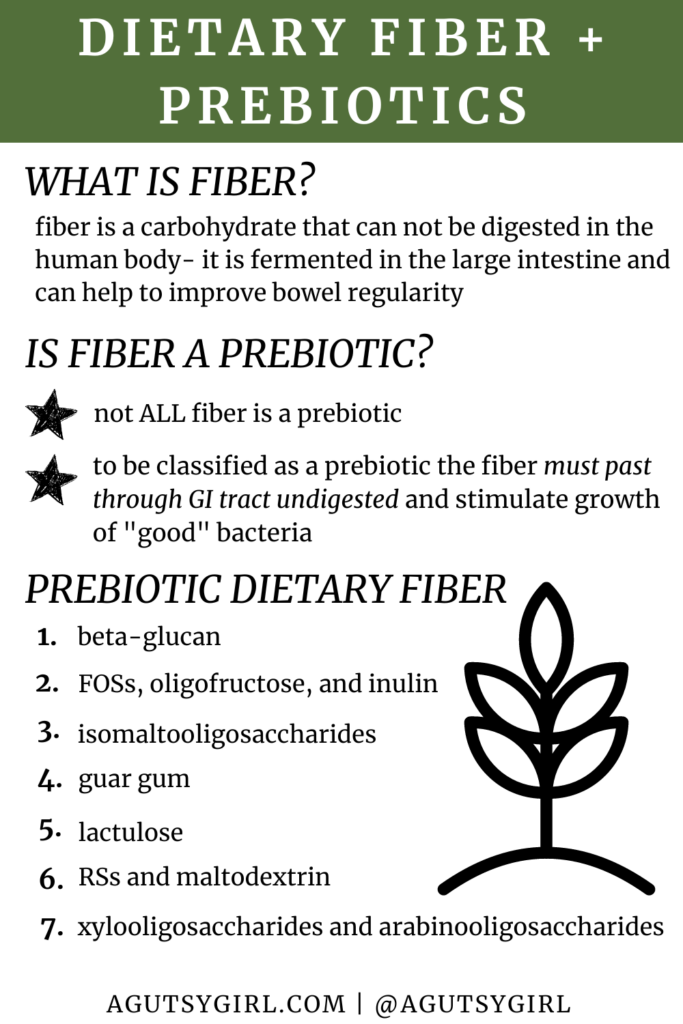
Let’s clear the air about something.
According to the Monash University,
A prebiotic is a type of fibre (but not all fibre is prebiotic). To be classified as a prebiotic, the fibre must pass through the GI tract undigested and stimulate the growth and/or activity of certain ‘good’ bacteria in the large intestine. Prebiotics include fructans and galacto-oligosachairdes (GOS).
Monash University
To this extent, here is the list of Prebiotic Dietary Fiber Sources from the NIH:
- Beta-glucan
- FOSs, oligofructose, and inulin
- GOSs
- Isomaltooligosaccharides
- Guar Gum
- Lactulose
- RSs and maltodextrin
- Xylooligosaccharides and arabinooligosaccharides
And to be clear, the 9 foods listed out from above contain at least one, if not more, of these dietary fiber sources. It’s basically just a confusing never-ending glossary of one word that might be correlated to several others.
Type of Fiber
I have written in detail about soluble fiber vs insoluble fiber.
These are different types of fibers; soluble fiber, which is fermented by gut bacteria, and insoluble fiber, which is not fermentable and acts as roughage.
I found this incredible graphic that explains the differences between fiber and prebiotics from the ISAPP.
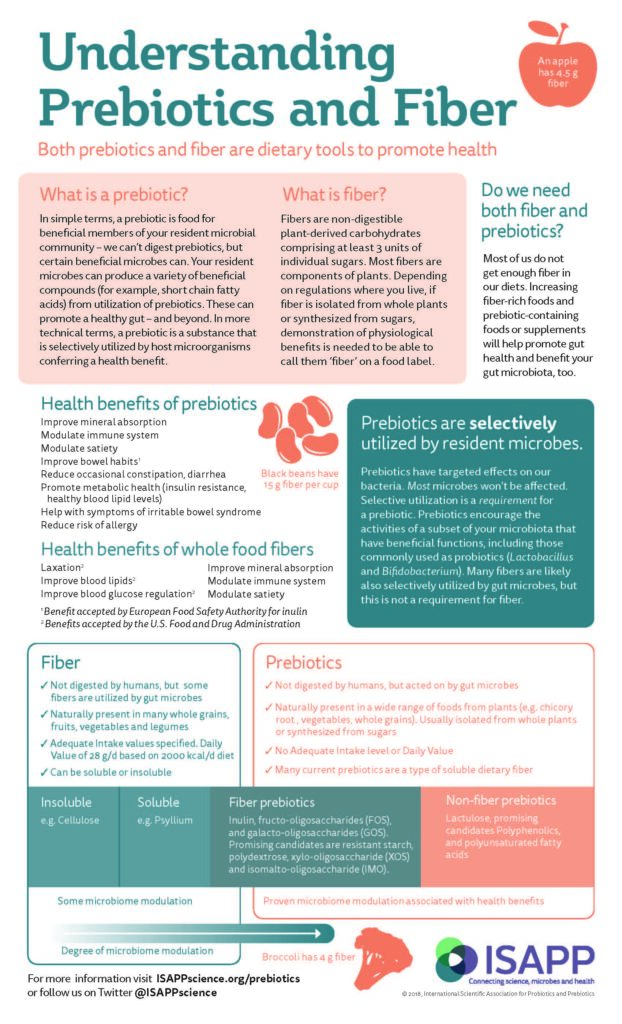
In other words, it’s not just as simple as to say, “We need prebiotics, any prebiotic; all prebiotics are the same.”
They aren’t all the same and that’s not to say that they can’t all work. What it does mean is that you might do better with some vs. others, and some are giving more bang for your buck than others.
Prebiotic in Supplement Form
Question of the day,
So, how many grams or prebiotics do I need per day to make it count?
According to my school and course, you only need to get approximately 2-6 grams of prebiotics per day in order to obtain the health benefits prebiotics provide. (However, you’ll see in the image above that there technically is no daily value.)
They also made note that choosing to supplement your prebiotic can be a good idea because they are far easier on the digestive tract since the foods high in prebiotics can be hard to digest for many.
Furthermore, should you choose to supplement, a powder vs a pill is optimal because again, it’s easier for the body to break down.
Honestly, this part is key for the Gutsy ladies.
Taking the right PREbiotic can actually double the power of your gut health regimen.
Unfortunately…
Taking the wrong PREbiotic has the side effects of making your health issues even worse.
PREbiotics work overtime to keep you healthy – that’s why it’s essential to take them on a daily basis.
But please note: not all PREbiotics are created equal.
In fact, there’s many that do more harm than good.
Specifically, you’ll want to watch out for popular products with oligofructose and inulin.
They can cause GI distress and further digestive issues, or worse… They can actually feed and fuel pathogens.
The last thing you want to do with bad bacteria in your gut is give them tools to survive and thrive. If you do that, they can easily take over your gut, and make your IBS symptoms worse.
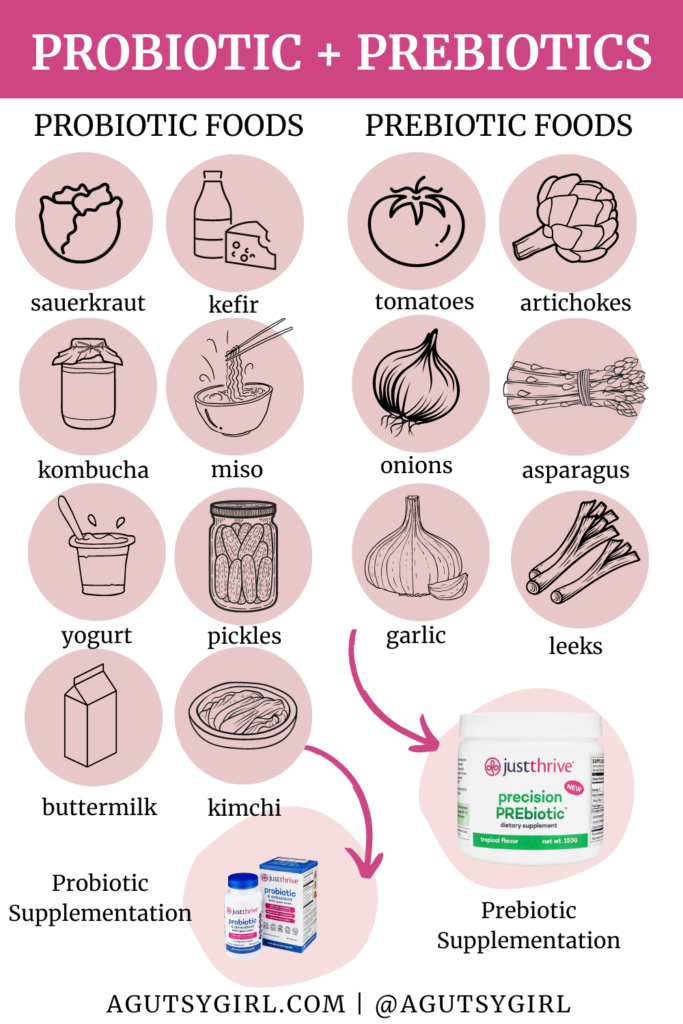
Best Prebiotic Supplements
There are a few dietary supplements for top-quality prebiotics I like.
- Just Thrive Precision PREbiotic (pill version)
- Just Thrive Precision PREbiotic (powder version)
- MegaPre Precision Prebiotic (powder version)
Just Thrive Precision PREbiotic
The Just Thrive Precision PREbiotics contains these 3 clinically proven strains of PREbiotics (which are natural ingredients, by the way):
- Fructooligosaccharides (Non-GMO green and gold kiwifruit)
- Xylooligosaccharides (Non-GMO corn cob)
- Galactooligosaccharides (rBST-free cow’s milk)
These ingredients are included because they have been shown to:
- Only fuel the good bacteria (and completely ignore the pathogens)
- Soothe gastrointestinal (GI) distress, such as gas and bloating (compared to other prebiotic fibers that can cause MORE gastrointestinal distress)
- Drive the healthy growth of your beneficial bacterial populations… In fact, when you combine Precision PREbiotic with Just Thrive Probiotic, you can double the amount of “good guys” in your gut.
The “smart” fibers in Precision PREbiotic can help you unlock your health potential.
Here are several reasons why this is one of my top picks:
- Nourishes ONLY your good gut bacteria*
- Can more than DOUBLE your population of good bacteria*
- Provides crucial digestive and immune support*
- Supports bowel regularity
- Reduces flatulence, bloating and abdominal pain
- Drives butyrate production (butyrate is the primary fuel for your natural killer immune cells)*
- Increases nutrient absorption*
- Encourages feelings of fullness for easy weight management*
- Supports healthy sugar metabolism*
- Microbiologist-formulated, evidence-based, and safe*
- Non-GMO and made WITHOUT gluten, soy, sugar, and nuts
- The 3 super fibers in Precision PREbiotic can be easily taken in a daily capsule or you can mix up a batch of Precision PREbiotic drink mix in the morning and take sips throughout the day. Either way, your good bacteria will get all the fuel it needs to power your immune system and help you feel good around the clock.
MegaPre Precision Prebiotic
The other prebiotic supplement I have used and like is from Microbiome Labs.
1 scoop includes 3.8 grams Galacto-oligosaccharides + Organic Xylooligosaccharides + Organic gold and green kiwifruit powder.
Now, make note that this one does include one or more ingredient that has been derived from lactose from bovine milk.
However, I still believe that this product is wonderful, and I trust Microbiome Labs equally.
PRObiotics + PREbiotics
Now, I would be remiss if I didn’t share this important information regarding probiotic supplements and prebiotics supplements.
Here’s the truth:
Think of your gut like a garden… When you seed it with a probiotic (like my best probiotic supplement, Just Thrive Probiotic’s spore-based bacteria), you can better combat gastrointestinal issues and keep your digestive system in a happy place with healthy digestion.
And similar to how the right fertilizer can help your garden grow, the best prebiotic fiber supplements will act like a fertilizer for your Probiotic garden, helping your newly planted, good bacteria thrive!
Essentially, PREbiotic is food – a uniquely designed type of food that is smart enough to avoid all the bad bacteria.
What this all means is that a healthy microbiome depends on both PRObiotcs and PREbiotics.
Some of my favorite probiotic foods include: yogurt, kimchi, sauerkraut, and miso.
And my favorite probiotic supplement is the Just Thrive probiotic due to the different probiotic strains that I believe have been well-researched for the irritable bowel syndrome AND inflammatory bowel disease populations.
You can learn more about probiotics HERE.
Which PRObiotcs + PREbiotics Am I Missing?
There is no real easy way to determine which PRObitocs and PREbiotics you’re missing.
However, the Viome Gut Microbiome test will tell you the following:
- vitamins to take
- minerals to consider
- food extracts
- herbs that you might include
- amino acids for you
- prebiotics to add
- probiotics to consider
Notice numbers 6 and 7.
According to Viome, my precision formula contains 43 nutrients and 16 probiotics + prebiotics.
If you want to get your own results, click HERE then at checkout use code AGUTSYGIRL to save $110 off your own testing kit.
When it comes to the fiber and PREbiotic conversation, there is so much to discuss and many intricacies to dive into. I hope this has at least given you a little more context for why they are so important and how to start incorporating more into your own life.
I’d love to keep writing more on fiber and PREbiotics, since I do believe there are so many misconceptions about them in the gut healing and gut health communities.
What do you want to know? Is there anything in particular that would be helpful to know and understand for your own journey? Comment below!
Sources: HERE, HERE, HERE, and HERE.
If you liked this post on the Best Prebiotics Supplements + All About Prebiotics, you might enjoy:
- Betaine HCL (vs. Digestive Enzymes)
- DHA vs EPA {Episode 73, Bites 19}
- 13 Probiotic Benefits Beyond Gut Health
Disclosure: When you purchase via any of the links in this post, I am paid a small affiliate commission. All opinions stated here are 100% my own. I appreciate your support. This compensation helps with expenses to keep the website up and running. And, of course, this allows me to continue sharing all that I can with you. For my full disclaimer and disclosure click HERE. Thank you for your support!
Xox,
SKH
🤰 bloating be gone! weight loss through optimal gut health for women
💃ʜᴇᴀʟ ʏᴏᴜʀ ɢᴜᴛ. ʜᴇᴀʟ ʏᴏᴜʀ ʟɪfe.
🫶🏻 founder gutbyome.com

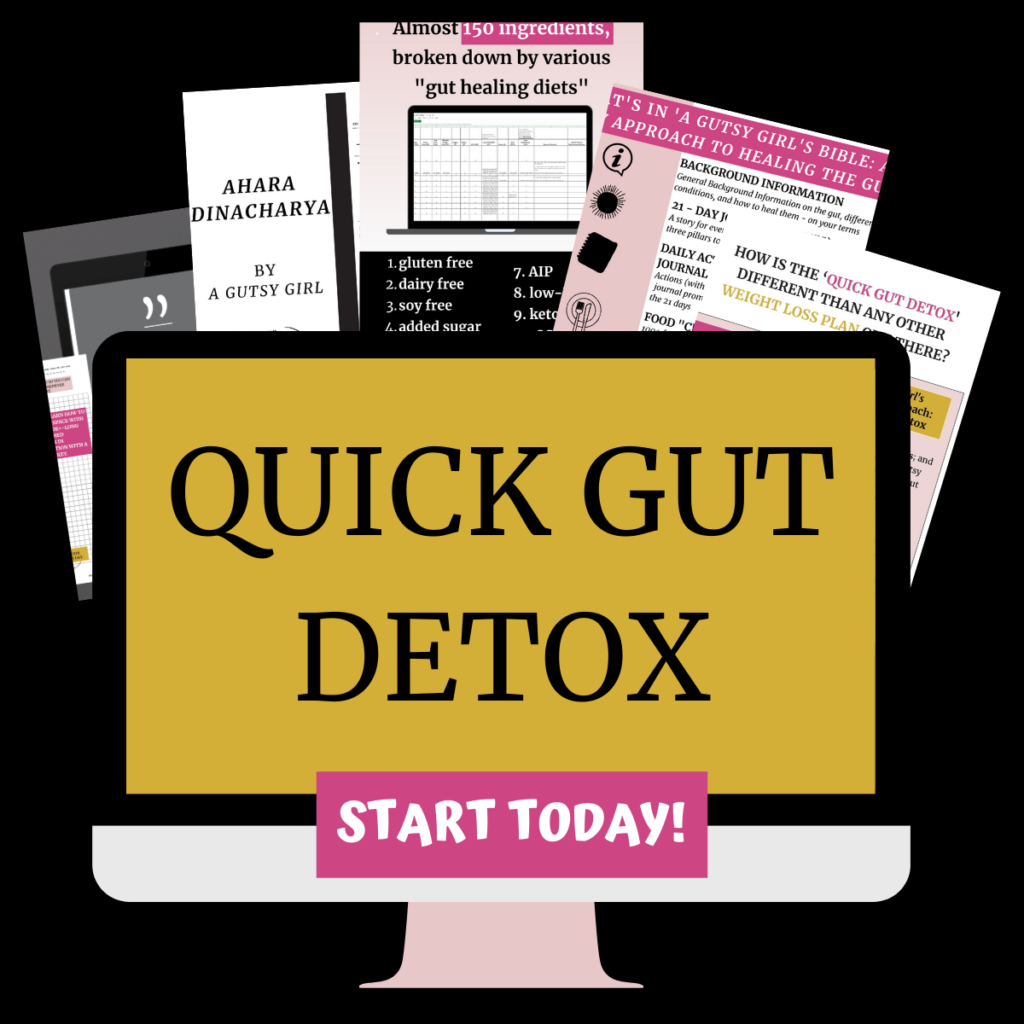


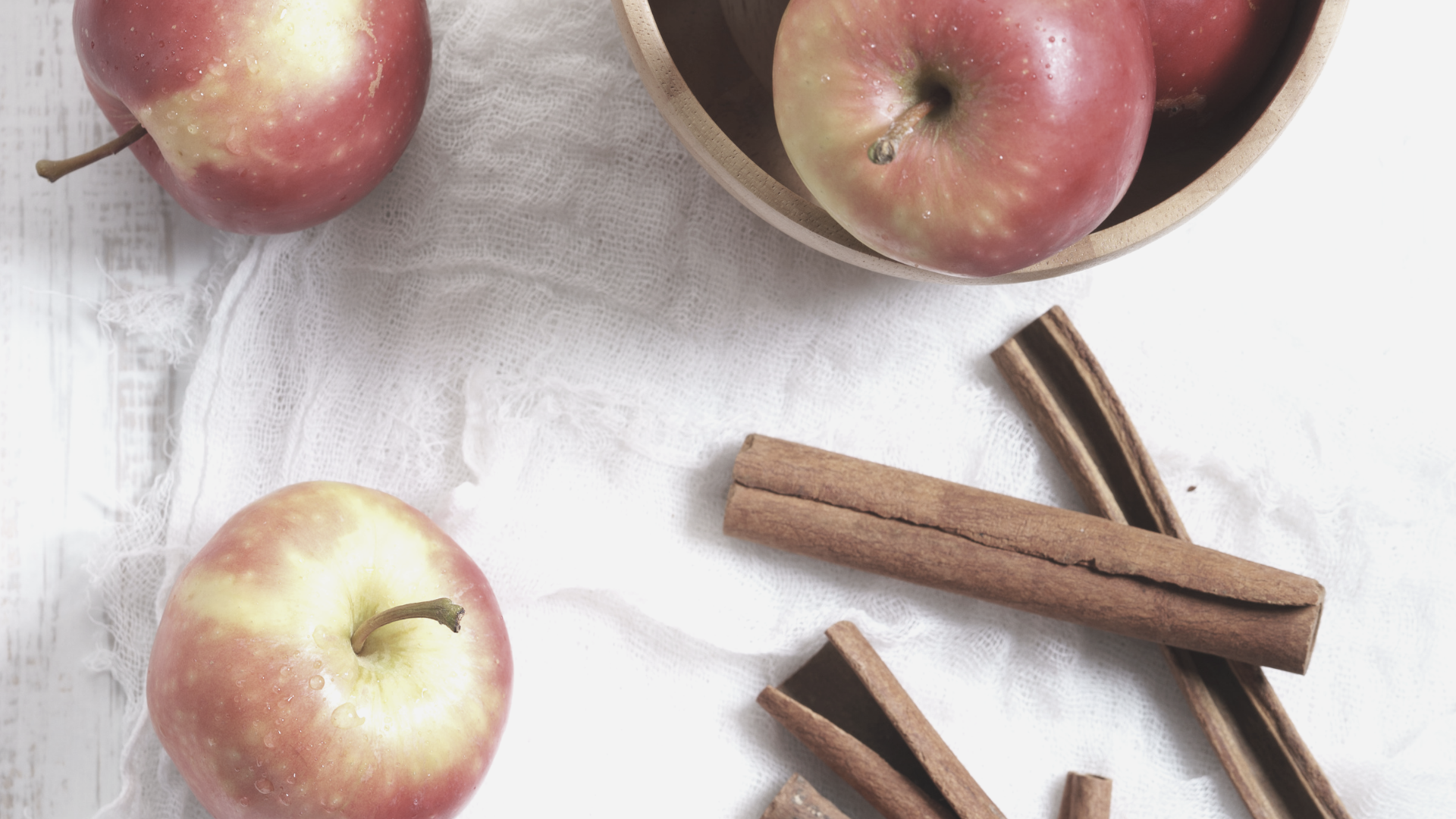



Hi, Sarah: I have two questions about how to take the pre-biotics in capsule form. Should you start slowly? And should you take them at the same time as probiotics or space them out? Thanks so much!
Hi Melissa! I reached out to them and here is the response: “We recommend starting slowly with 1/2 dosage for a few days. And to take the PRE about 30-60 minutes before the PRO if possible. Otherwise they can be taken together.” Hope that helps! xo